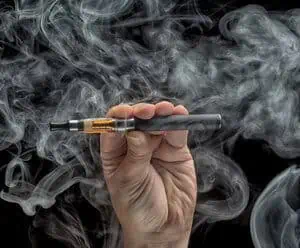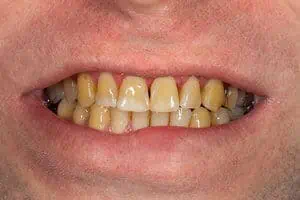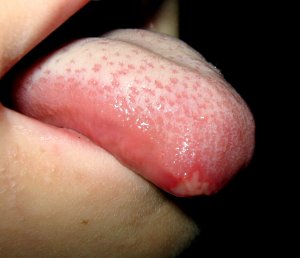Is vaping bad for your teeth? Most cigarette smokers are aware of the negative effects on their general and oral health, but what about the ‘healthier’ alternative of e-cigarettes?
Around 3.2 million people in the UK use e-cigarettes, and over half of those are ex-smokers. While this undoubtedly represents a step in the right direction for the nation’s health, the question still remains: Does vaping damage teeth?
If you’ve ever wondered how vaping affects your teeth, gums, and oral hygiene, this article if for you. We’re going to answer common questions including:
- Does vaping stain teeth?
- Can vaping cause tooth decay?
- Does vaping cause bad breath?
- Is vaping better than smoking when it comes to oral health?
- When is it safe to vape after tooth extraction?
Stay tuned as we look through these issues in detail and present some ways to take care of your teeth and gums when using e-cigarettes.
What is vaping?

Vaping technology was patented way back in 1960 but it failed to take off at the time. Today, vaping devices have gained popularity, particularly because of better marketing strategies and social media trends.
Modern vaping devices usually look like pens and are often marketed with tempting flavours, making them particularly appealing to younger generations. These portable devices use battery-generated heat to convert e-liquids into vapours containing a variable amount of nicotine.
On the whole, vaping is considered a less harmful alternative to smoking. This is because the vapour inhaled from an e-cigarette is free from many of the harmful chemicals generated from burning tobacco.
However, there are still certain ways that vaping can affect teeth. If you use e-cigarettes, it’s good to be aware of these risks and take steps to mitigate the damage from vaping.
Is vaping bad for your teeth?

It may not be as bad as cigarettes, but vaping can still damage teeth and lead to decay and gum disease. Here are some of the main ingredients in e-cigarettes that can harm your teeth and mouth:
Propylene Glycol (PG)
Propylene Glycol (PG) is a colourless, odourless, synthetic carrier product with a slightly sweet taste. The products formed when PG breaks down in the mouth are noxious for tooth enamel and soft tissues. This means it can damage teeth enamel and gums. Because of its hygroscopic chemical composition, PG absorbs moisture in the mouth, which is why vapers often experience dry mouth.
Vegetable Glycerin (VG)
Another common ingredient of e-cigarettes, Vegetable Glycerin (VG) is a clear liquid typically synthesized from soybean or coconut. It has a sweet taste, and although it is thought not to directly contribute to dental caries, it becomes more harmful when combined with flavouring agents in e-liquid. In fact, flavoured vapes can double the formation of biofilm (dental plaque) and reduce enamel hardness by 27%, compared to those with no added flavour.
Nicotine
Nicotine is a highly addictive chemical and is a well-known cause of stained teeth among smokers. While the potency of nicotine can be much lower in vapes, it still causes tooth discolouration when inhaled. Nicotine becomes brown instantly when it comes into contact with oxygen. The porous nature of human teeth enamel means the staining pigments are easily absorbed, so vaping will stain teeth over time. Unless, of course, you choose to vape without nicotine.
Nicotine also reduces blood flow in the mouth, which can mask the signs of gum disease and make it harder for the body to fight infection. It also reduces the flow of saliva, leading to dry mouth and numerous other complications.
Is vaping better for your teeth than smoking?
On the whole, vaping is likely to be less damaging to teeth than smoking cigarettes. This is mainly because cigarette smoke contains tar, which aids bacteria formation and also stains teeth. However, nicotine does still have adverse effects on teeth and oral health, so the concentration of nicotine used in the e-liquid is a key consideration.
In the video below, a periodontist discusses his views on smoking vs. vaping damaging the mouth. He cites this study from the Royal College of Physicians which suggests that long-term vaping is only around 5% as harmful to health as long-term smoking.
Now, let’s look at a few specific concerns people have about vaping damaging teeth.
Does vaping stain teeth?
Assuming you are vaping with nicotine, yes it will stain your teeth. The effects may not be as severe as with tobacco smoking, since there is no tar in the vapour from e-cigarettes. So while you might avoid the full-on smoker’s teeth look, vaping will cause yellow teeth over time.

There are various teeth whitening solutions that can help teeth stained by vaping. Professional whitening with a dentist is usually the most effective and gives the fastest results, but not everybody has the budget for that. A home whitening kit is a more affordable alternative. Most people can achieve several shades of whitening this way, and with regular use it should help keep vaping teeth stains at bay.
Does vaping cause bad breath?
Most vapers – and those around them – will agree that vaping is far preferable to smoking in terms of bad breath. As e-liquid is odourless or pleasantly flavoured, there is no bad odour that comes directly from having the vapour in your mouth.
However, there are some indirect effects of vaping that can cause bad breath. We mentioned above that both Propylene Glycol and nicotine make the mouth dry out, and this is one of the main causes of bad breath. Without the right amount of saliva to regulate the environment in your mouth and wash away bacteria, it can get pretty stinky.
Does vaping cause tooth decay?
Yes, but not directly. You might be able to live with yellow teeth and bad breath, but it’s a real cause for concern if your vaping habit is damaging your teeth permanently.
Again, there are several ways in which vaping can contribute to a less-than-ideal environment in the mouth:
- Decreased blood circulation
- Decreased saliva flow
- Increased plaque levels
- Softened enamel (especially with flavoured vapes)
All of these factors can make vapers especially susceptible to tooth decay and gum disease. So although vaping doesn’t rot teeth directly, it certainly contributes to these problems. A strict oral hygiene routine and regular dental checkups will help minimise the risk.
Can vaping cause mouth ulcers?

There are many factors that can contribute to mouth ulcers, also known as canker sores. Stress, diet, allergies and injuries are just a few. The high temperature of the vapour produced by e-cigarettes can also cause inflammation in the mouth, meaning that vape users are more susceptible to ulcers.
Additionally, vaping may hamper the recovery of mouth ulcers, which usually heal by themselves. The toxic chemicals in e-liquid interfere with the natural healing process, so vapers may find their mouth ulcers stick around for longer.
Vaping and teeth sensitivity
Tooth sensitivity normally occurs because of thinning enamel, whether due to a cavity or general erosion. Vaping is linked to both of these things, and flavoured vapes can also soften the enamel and make it more porous.
So, if you notice your teeth are more sensitive after you start vaping, chances are the two are connected. A remineralizing toothpaste should help with this, but it’s also important you mention it at your next dental checkup.
How long after tooth extraction can I vape?
If you need to have a tooth extracted, you’ll probably be advised not to smoke or vape for at least 72 hours afterwards. The suction created when inhaling can dislodge the blood clot in the socket. This can lead to an extremely painful condition called dry socket.
In addition, nicotine impairs the healing process in the mouth, so it’s best to minimise vaping after any oral surgery until you are fully recovered.
How to minimise the effects of vaping on your oral health
The best way to reduce damage to your teeth from vaping is to cut down – both in terms of how often you vape and on the strength of your e-liquid. It’s nicotine which makes vaping really bad for teeth, so the less nicotine you inhale, the better. That said, even nicotine-free e-liquids pose some risk to teeth and gums because of the other chemicals they contain.
While you work on cutting back or quitting altogether, here are some other ways to make vaping slightly less bad for your teeth:
- Regularly drink water after you vape to avoid dry mouth. Keeping yourself hydrated will help minimise bacteria buildup and the bad smells it causes.
- Switch to a flavour-free e-liquid, which may be less damaging to your teeth.
- Ensure you are brushing your teeth properly twice a day and flossing daily. A smart electric toothbrush can help you improve your brushing technique and make sure you’re cleaning your teeth thoroughly.
- Use a remineralizing toothpaste to help combat sensitivity and other side-effects of vaping.
- Have regular dental checkups and cleanings to keep your teeth in good condition and pick up on any problems early.
- Try a home whitening kit to combat vaping stains.
Conclusion
So, is vaping bad for teeth? Yes, but is it as bad as smoking tobacco? Probably not. Many people who vape do so to cut down on nicotine and eventually quit, so it can be really beneficial in this sense.
But, don’t be lulled into a false sense of security by thinking that vaping is a safe alternative to smoking. While it may be better for your health, it can still damage your teeth if you don’t take extra care. In particular, you’re at greater risk of:
- Tooth decay and tooth loss
- Bad breath
- Gum disease or periodontal disease
- Receding gums and damage to the gum tissue
- Inflammation and mouth ulcers
If you’re not ready to quit just yet, it’s essential you get regular dental checkups and take extra care with your daily brushing and flossing.
Medical Brief: 3.2 million vape in UK as smokers ‘get the message’ that e-cigs are healthier. Consulted 4nd January 2022
Dentistry Online: Smoking versus vaping: which is worse for your teeth? Consulted 22nd January 2021
Royal College of Physicians: Nicotine without smoke: Tobacco harm reduction. Consulted 22nd January 2021
PLOS ONE: Cariogenic potential of sweet flavors in electronic-cigarette liquids. Consulted 22nd January 2021




